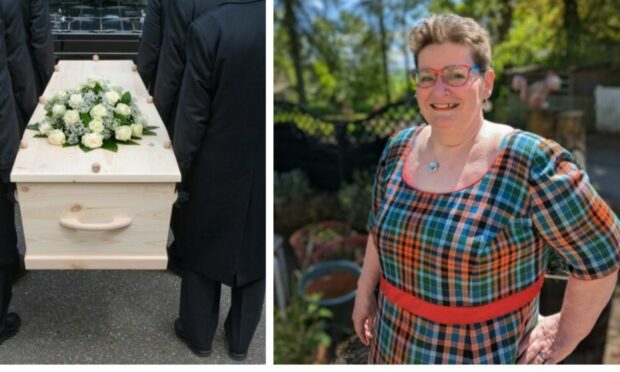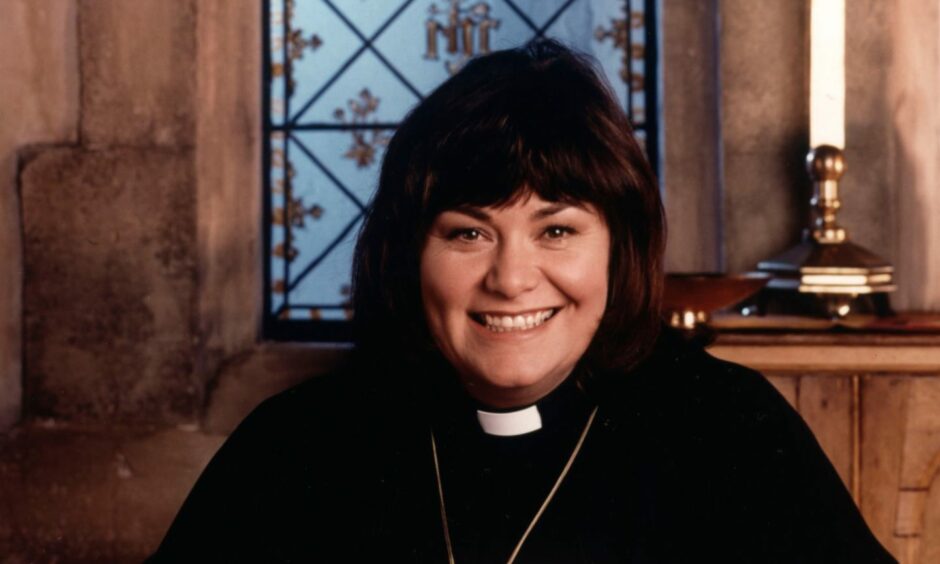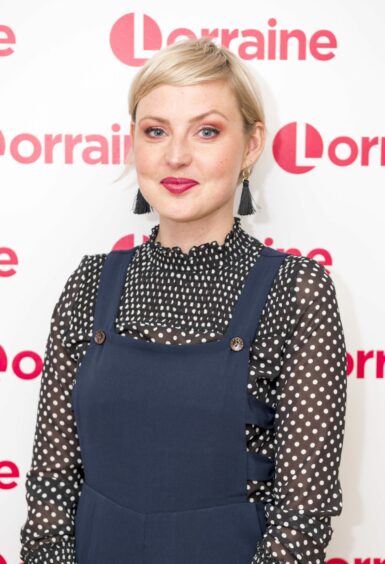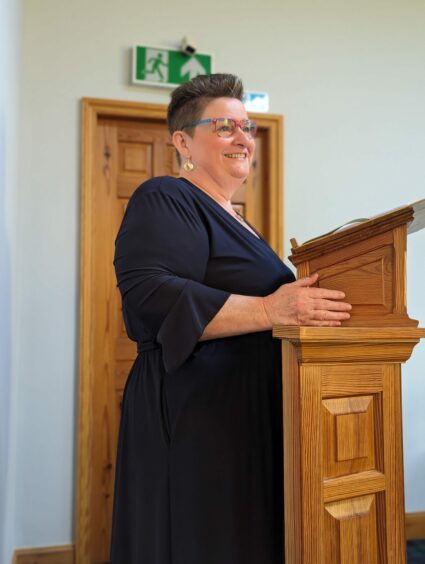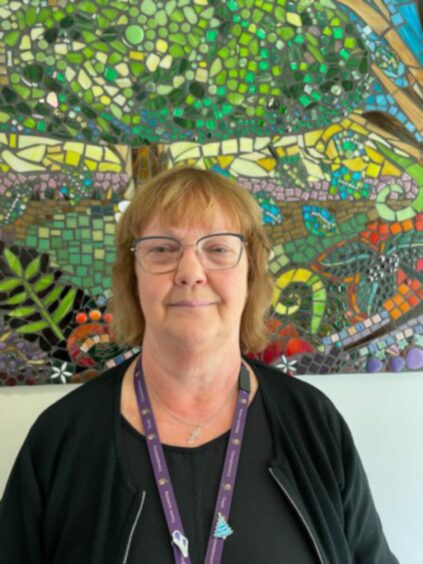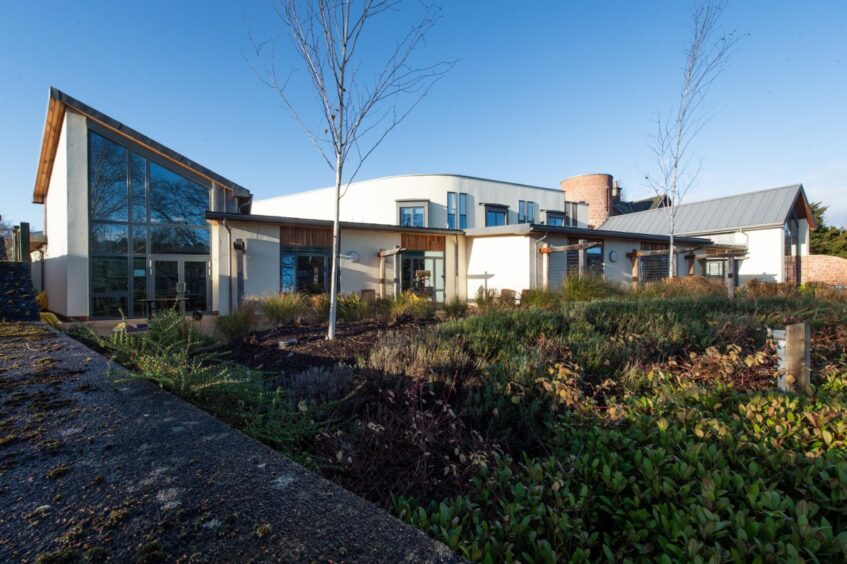“Why would you say he passed away?
“Why not just say he died?”
Isabel Lockhart is polite but firm when it comes to talking about death, and became a celebrant after her son, Ben, died suddenly.
Life and death is part and parcel of her job, and Isabel can go from a naming ceremony to a memorial service and everything in-between.
She also founded the first coffin club in Aberdeenshire, which provides a safe space for people to ask questions about planning a funeral.
Putting the fun in funeral
Her determination to get people talking about death could be seen as morbid, but Isabel believes the topic of dying is anything but.
It should come as no surprise that she is firmly in favour of living funerals, which aren’t so different from a traditional service – except you get to attend instead of lying in a casket.
The concept enables people who are terminally ill to have a celebration of life with friends, almost like a pre-funeral, and join in with the memories and anecdotes of their life.
Actress Dawn French recently reprised her role as Vicar of Dibley, and delivered the eulogy at the FUNeral of her friend and founder of CoppaFeel, Kris Hallenga, who is living with stage four breast cancer.
Could living funerals change the way we look at death, and enable important conversations to take place before it’s too late?
We caught up with Isabel, and Highland Hospice chaplain Norma Higgott, to find out more and hear their perspectives on this approach to dying.
Aberdeenshire celebrant Isabel Lockhart on living funerals: ‘Death isn’t morbid’
“If I was given a terminal diagnosis, I would want a living funeral,” says Isabel, who is based in Aboyne.
“All too often when someone dies, people will be at the wake for example and say ‘Oh he was such a lovely man.’
“Why don’t you tell that person when they are alive?
“Living funerals can enable friends and family to share their memories of you, with you.”
For Isabel, a living funeral would enable her to pass on special pieces of jewellery and pictures to the right people as gifts.
“It stops all the arguing and ultimately it’s a celebration with the people who you love the most,” she says.
“I’d do a vow renewal at my living funeral, I see it as my final fling.”
Changing conversations about life and death
Isabel’s son died in 2019, and although he had cystic fibrosis, his death was unexpected.
Having previously helped put care packages into action for people, Isabel could not face doing that same role and instead became a celebrant which had long been on her radar.
“People don’t like talking about, or facing the fact that we are going to die,” said Isabel.
“100% of us are going to die, but only 6% actively plan for it.
“You don’t even have to have a funeral, I personally want a direct cremation.”
Isabel believes that the traditional way of choosing a coffin and flowers from a catalogue “like you’d choose a washing machine from Curries” means people are unaware of the options available.
“You can have a funeral anywhere where you can get a coffin in and out,” she says.
“I did a funeral beside a loch, it was the obvious choice as the person was an avid fisherman.
“I think the more people find out about living funerals and the concept, when you know you’re going to die it’s a way of getting everyone together to tell your story.
“We have made death into something which is morbid, it’s a natural part of life.”
Norma Higgott: ‘It is not a funeral, it’s a celebration’
Norma Higgott has been the resident chaplain at Highland Hospice for seven years, which is the only provider of specialist palliative care in the Highlands.
It helps people to prepare for and experience the “best possible death” but also to celebrate life.
For Norma, traditional funerals still very much have a purpose, but living funerals happen regularly at Highland Hospice – only in a different guise.
“My concept of a living funeral is that it is not actually a funeral, but a final fling,” says Norma.
“It is a final celebration, whereas a funeral is a way of saying goodbye after someone has died.
Tell people you love them when they’re still alive
“We celebrate someone’s life at the hospice all the time; we recently helped a lovely lady and her husband celebrate their wedding anniversary.
“If it’s someone’s birthday we have a party and cake, we celebrate that person.
“We’re really about appreciating people when they are living.”
In Norma’s eyes, the terminology could do with some work but the concept of celebration is spot on.
“Why is it that we can’t tell people we love them, we appreciate all they’ve done for us before they have died,” she says.
“When I was little, death was not hidden away and nor was it feared.
“I think we’re getting more open to conversations but it’s a very slow process, which requires lots of people willing to talk about it.
“We encourage people to go out if they can, get along to Eden Court or attend a wedding.
“We make it possible and I feel very privileged to walk alongside people on this journey.”
